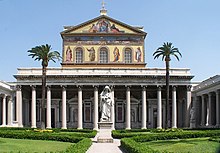San Paolo fuori le Muri
| Basilica of St. Paul Outside the Walls | |
|---|---|
| Papal Basilica of Saint Paul Outside the Walls | |

Façade of the Basilica of St. Paul Outside the Walls
|
|
| 41°51′31″N 12°28′38″E / 41.85861°N 12.47722°ECoordinates: 41°51′31″N 12°28′38″E / 41.85861°N 12.47722°E | |
| Location | Rome |
| Country | Italy |
| Denomination | Roman Catholic |
| Tradition | Latin Rite |
| Website | Basillica of St. Paul Outside the Walls |
| History | |
| Dedication | St. Paul the Apostle |
| Consecrated | AD 4th century |
| Architecture | |
| Status | Papal major basilica |
| Architect(s) | Luigi Poletti (reconstruction) |
| Architectural type | Church |
| Style | Neoclassical |
| Groundbreaking | AD 4th century |
| Completed | 1823 |
| Specifications | |
| Length | 150 metres (490 ft) |
| Width | 80 metres (260 ft) |
| Nave width | 30 metres (98 ft) |
| Height | 73 metres (240 ft) |
| Administration | |
| Diocese | Diocese of Rome |
| Clergy | |
| Archpriest | James Michael Harvey |
| Official name | Historic Centre of Rome, the Properties of the Holy See in that City Enjoying Extraterritorial Rights and San Paolo Fuori le Mura |
| Type | Cultural |
| Criteria | i, ii, iii, iv, vi |
| Designated | 1980 (4th session) |
| Reference no. | 91 |
| State Party | Italy and Holy See |
| Region | Europe and North America |
The Papal Basilica of St. Paul outside the Walls (Italian: Basilica Papale di San Paolo fuori le Mura), commonly known as St. Paul's outside the Walls, is one of Rome's four ancient, Papal, major basilicas, along with the Basilicas of St. John in the Lateran, St. Peter's, and St. Mary Major.
The Basilica is within Italian territory and not the territory of the Vatican City State. However, the Holy See fully owns the Basilica, and Italy is legally obligated to recognize its full ownership thereof and to concede to it "the immunity granted by International Law to the headquarters of the diplomatic agents of foreign States".
James Michael Harvey was named Archpriest of the Basilica in 2012.
The Basilica was founded by the Roman Emperor Constantine I over the burial place of St. Paul, where it was said that, after the Apostle's execution, his followers erected a memorial, called a cella memoriae.
In 386, Emperor Theodosius I began erecting a much larger and more beautiful basilica with a nave and four aisles with a transept; the work including the mosaics was not completed until Leo I's pontificate (440–461). In the 5th century it was larger than the Old St. Peter's Basilica. The Christian poet Prudentius, who saw it at the time of emperor Honorius (395–423), describes the splendours of the monument in a few expressive lines.
...
Wikipedia

